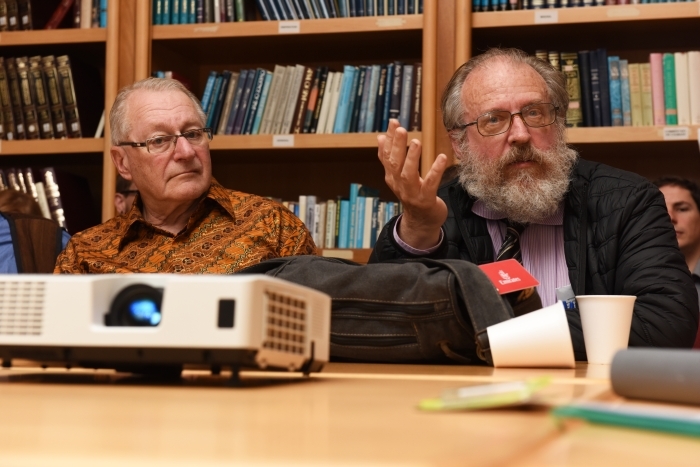Struggle veterans recall Kennedy's 1966 “Ripple of Hope” speech
31 March 2016 | Story Helen Swingler. Photo Michael Hammond.
In June 1966 US Senator Robert F Kennedy visited South Africa to deliver his Day of Affirmation address to the National Union of South African Students' (NUSAS). South Africa was in the tightening grip of apartheid, which was accompanied by rising incidents of banning and detention without trial.
It was NUSAS president Ian Robertson's invitation that brought Kennedy to South Africa and it was intended to rally opposition to apartheid. The government was particularly twitchy about the visit. Robertson himself had been banned a month before Kennedy arrived.
Kennedy visited four universities, including UCT where liberalism and anti-government sentiment were on the rise among its students.
Addressing a packed Jameson Hall on 6 June 1966, Kennedy said: “Each time a man stands up for an ideal, or acts to improve the lot of others, or strikes out against injustice, he sends forth a tiny ripple of hope, and crossing each other from a million different centres of energy and daring, those ripples build a current which can sweep down the mightiest walls of oppression and resistance.”
The speech is regarded as Kennedy's finest and became the subject of a documentary, RFK in the Land of Apartheid, by local filmmaker Larry Shore and Kathleen Kennedy Townsend, Kennedy's eldest daughter.
The Kennedy visit footage was shown at the colloquium alongside In God's Country, a documentary made by a Canadian Broadcasting Corporation (CBC) TV team, which visited campus a few months later. This film highlighted the September 1966 student protest against the visit to UCT of Jan Haak, the minister of mines and planning. Haak had been invited to UCT to open the Snape Building.
The dangers of protest and of running up against the apartheid state were not taken lightly, said struggle stalwart Dr Ken Hughes, who appeared in the CBC video as a young student.
Now a retired member of the Department of Mathematics and Applied Mathematics at UCT, Hughes shared his recollections alongside those of anti-apartheid veteran and fellow UCT alumnus Keith Gottschalk. It was a case of learning which battles to pick, said Hughes, and how to fight them, subtly. That subtlety is seen in the clip where Hughes is interviewed about the anti-Haak demonstration.
“I'm asked what I see as the future [in South Africa] and I'm saying that the white regime will last a long time. But I'm clearly avoiding saying it will be overthrown in a bloody revolution … in those days one had to be very careful … there was a certain kind of code that was adopted. People would talk about bringing about social change in South Africa rather than revolutionising the society ...”
Hughes served on the UCT Students' Representative Council for two years and was part of a group associated with the university's benignly named Modern World Society, chaired by Andrew Colman (now a professor at the University of Leicester).
“I was recruited by Andrew, who at that stage was a Marxist – I was a radical liberal so I could join their organisation.”
Learning politics became a question of what they could and couldn't do.
“There were certain things you avoided doing and some of them were also because you didn't want to score an own goal. Some things were counterproductive and I'm very conscious [seeing this video clip again] of this.”
Hughes and his fellow student activists also avoided running up against pro-government staff at UCT. Dr JP Duminy, UCT's principal and vice-chancellor at the time, was criticised for his supposed complicity with apartheid.
“One of the things which there isn't a record of was an anonymous pamphlet we put out at the time called 'Yellow Duminy', which depicted Duminy in yellow, which showed that he was a coward,” says Hughes.
“It went out anonymously and it was a complete disaster. And so, one of the things I learnt early on was that if one were serious about politics, one needed to learn to anticipate what the responses would be and if one was very serious, you learnt to avoid the situation [that would lead to an own goal].”
When the state president visited campus in 1966, Hughes and his fellow activists knew “that having that kind of demonstration we'd just had with Haak wouldn't work”.
“We would have run into serious problems demonstrating against the state president … so I was tasked with the unenviable task of trying to persuade the students to not confront him. So I wrote a pamphlet, which we handed out instead. It was a splendid piece of subtlety called 'The Visit', and it referred to a movie and stage production that had been circulating by Swiss writer Friedrich Dürrenmatt.
The plot concerned a difficult trade-off between an embittered woman seeking revenge and the townspeople who would benefit from her largesse after committing murder on her behalf. The parallels were clear to those who understood, said Hughes.
“It was an appropriately subtle pamphlet that would evade censorship and it raised amusement and engagement among the radical students. And, most importantly, it prevented us from having a confrontation with the law. So it … was what we could do and what we couldn't do and how close we could sail to the wind.”
In their recollections, Hughes and Gottschalk provided an interesting glimpse of the early textures and nuances of student protest.
 This work is licensed under a Creative Commons Attribution-NoDerivatives 4.0 International License.
This work is licensed under a Creative Commons Attribution-NoDerivatives 4.0 International License.
Please view the republishing articles page for more information.










